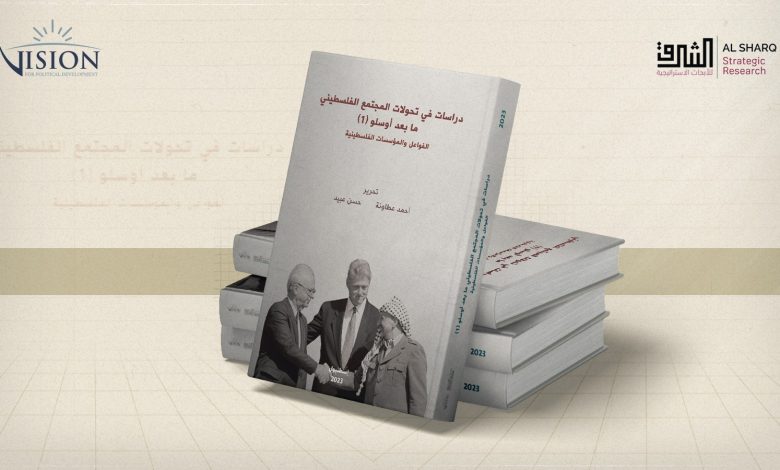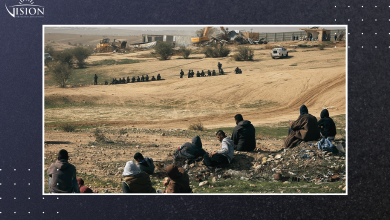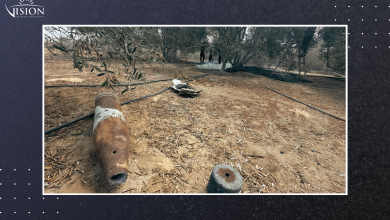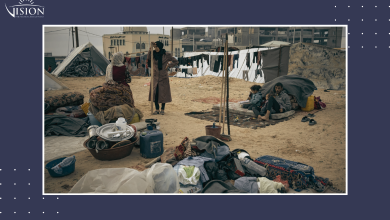Vision center and Al-Sharq Strategic Research release a book entitled “Studies on Transformations of Post-Oslo Palestinian Society: Palestinian Actors and Institutions”.

Istanbul
“Studies on Transformations of Post-Oslo Palestinian Society: Palestinian Actors and Institutions” is a book recently issued by Al-Sharq Strategic Research and Vision Center for Political Development written by a group of authors and edited by Ahmad Atawneh and Hassan Obaid.
The authors who contributed to the 381-page book are: Khaled Al-Hroub, Bilal Al-Shobaki, Hassan Ayyub, Muhannad Mustafa, Husam Al-Dajani, Adnan Abu Amer, Imtans Shehadeh, Areen Huwari, Saher Gazzawi, Rola Shahwan, Ayman Yusuf, Nihad Al-Sheikh Khalil, Jaber Suleiman, Hamdi Hussein, Awni Fares, Iyad Abu Zuneit, Khalil Shahin, Rashad Twam.
This book is the first publication of a working group launched by Al-Sharq Strategic Research and Vision Center for Political Development. It aims at studying the post-Oslo transformations in the Palestinian society in the West Bank, Gaza Strip, occupied territories in 1948, and in diaspora through a series of publications and conferences that seek to explore Palestinian social transformations.
It offers the Palestinian elite, decision makers, intellectual and think tanks and all those who are interested in the Palestinian affair, an insight into reality at the political, social, and economic levels, in terms of its nature and efficiency in the course of the Palestinian cause. It also contributes to set up a vision or a project that brings back consideration to the Palestinian cause and takes it out of the impasse it has been stuck in over the past four decades.
The Palestinian society has been going through, since the Oslo Accords in 1993 and the subsequent establishment of the Palestinian Authority, major political, economic, and social developments that have been dynamically affecting the orientations of the Palestinian society in its different places of residence as well as its perception of many issues, which is reflected on its political and national orientations.
Moreover, this book aims to investigate the role of the Palestinian actors in post-Oslo transformations in the Palestinian society. It focuses on their roles in social change, given that societal transformations take place with accordance to the plans of political actors and the changes experienced by the actors themselves.
The book also concentrated on shedding light on the actors such as factions, elite, and civil society as these components transcend the Palestinian demographic communities whereas an important part of which constitutes a bridge between the components of the Palestinian diaspora (such as factions), and despite the Palestinian division and dispersion, it is efficiently present.
The Palestinian factions are closer to social movements than to parties in terms of mobilization, infrastructure, and political and social framing as well as representation of Palestinians and confrontation with the Israeli occupation. This makes Palestinian factions similar to political clans of wide spectrums of society. In addition to the diversity of actors in the Palestinian situation, such as the elite, factions, families, civil society, youth, and women.
Besides, the book tries to study the transformations in Palestinian institutions structures, as a mechanism of understanding transformations in the Palestinian society.
Despite the various methodologies and hypotheses adopted by the authors, this work, that combines a group of research papers, represents a serious scientific effort, based on various primary sources discussed in each paper and presented in a special conference which allowed room for scientific critical discussions by the authors whose papers and contributions represented the book’s main topics and themes after development and improvement so that the book and its chapters are issued in its final form in an effort to provide a qualitative contribution to the Palestinian political, cultural and academic field.The first edition of the book is available at the Vision Center for Political Development and Al-Sharq Strategic Research in Istanbul.





